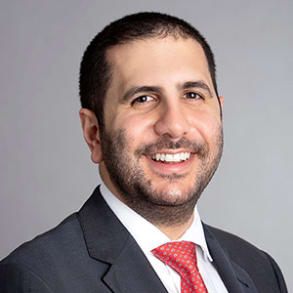Colorectal surgeon Peter Najjar explains when a patient with IBD should be referred to a surgeon, how to decide whether surgery or medical treatment is best for a patient and when minimally invasive surgery is right for a patient.
the decision of wonder for a patient with IBD to a surgeon is one that should be made together between the patient and the treating Gi physician. Um Typically patients are referred later on in their course when it seems that medical management isn't delivering the results that the gi physician and the patient had hoped. Um An early referral is always helpful. Um Even before it becomes clear that surgery might be indicated or necessary because it allows the surgeon, the G. I. Physician and the patient to all get to know one another and for the decision as to what the treatment course shouldn't tail and whether or not that does include surgery to be a more fully informed one. Um It's always better to have those conversations upfront. Um When there's less time pressure and more options available. The decision around when to include surgery as part of a comprehensive treatment plan for a patient with IBD um is a very very variable and personalized decision. Um A good relationship and clear communication between the G. I. Doctor and the patient is absolutely crucial and many times there's no clear right answer and patient factors including age, severity of disease, goals of care, quality of life. Um And a lot of psychosocial factors go into play. Um In making that decision, it should be a collaborative decision between the referring gi physician, the patient and in many cases the primary care provider in order to ensure the most optimal decision and timing um as to when to include surgical therapy as an adjunct to a patient's comprehensive IBD care plan. So decisions around operative technique and choice of operation for IBD patients is very variable. Um But we do try to push the envelope with minimally invasive surgery when it's appropriate. Um Oftentimes the smaller incisions and laparoscopic or robotic approach can lead to less postoperative pain um earlier return of malfunction um and less postoperative adhesions. Um That may complicate future surgery patients who are early on in their disease course who haven't had surgical resection in the past who present for elective surgery are typically good candidates for minimally invasive approaches. Unfortunately in patients who have had prior surgeries or in whom the surgery is urgent or emergent or who have very complex or fist realizing disease. Um The safest approach is oftentimes an open approach because it allows better visualization um and is often times the better way to go forward for patients. Mm hmm mm hmm. The decision to consider using surgeries and adjunct to a patient's IBD care is critical and it's one that should be made collaboratively with the patient, the referring gi physician. And oftentimes a primary care doctor and whatever support network the patient may have. It's very very critical because surgery is sort of a defined episode to make sure that patients return to their primary care doctors and they're treating gi physicians with comprehensive records that document all of the care that they received um While at johns Hopkins. Um And and also an easy way to contact the operating surgeon so that questions can be answered and we can facilitate the safest, um and highest quality transitions and care possible, um, when physicians operate as a team, regardless of whether those physicians are all within the Hopkins network or when it's a referral from the outside, patients always benefit. And so we work very, very hard to make ourselves available and ensure that those lines of communication remain open and that those transitions of care are as seamless as possible. Yeah.



